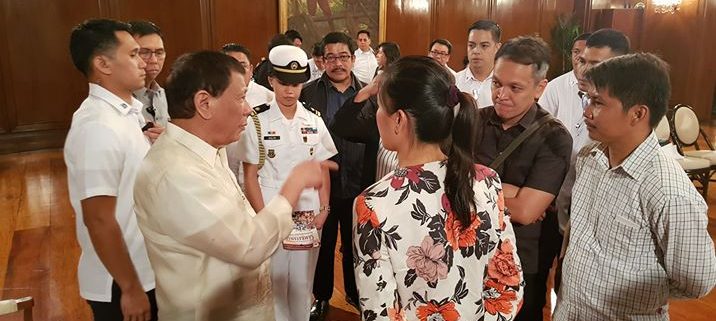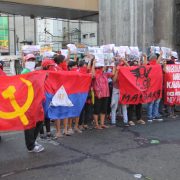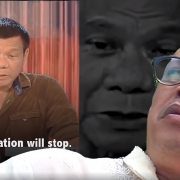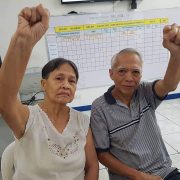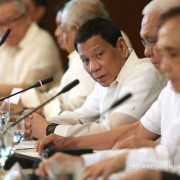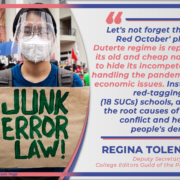Activists score Malacañang’s cancellation of backchannel talks with Reds
The peace talks must continue even under conditions of intense fighting between the New People’s Army (NPA) and the Armed Forces of the Philippines (AFP), Bagong Alyansang Makabayan said in response to the Government of the Republic of the Philippines’ (GRP) cancellation of its scheduled backchannel talks with the the National Democratic Front of the Philippines (NDFP).
Bayan secretary general Renato Reyes Jr. in a statement said the clashes between the NPA and the AFP today are additional reasons the peace talks must be held to find a way to stop the fighting.
“Insisting that the fighting stop before even the talks can proceed goes against the very nature of the talks. It puts the cart before the horse, so to speak,” Reyes said.
Reyes was reacting to Presidential Adviser on the Peace Process Jesus Dureza’s cancellation today of the scheduled backchannel talks between the GRP and the NDFP following an encounter between the Armed Forces of the Philippines (AFP) and the New People’s Army (NPA) in Arakan, North Cotabato this morning.
“I am announcing the cancellation of backchannel talks with the CPP/NPA/NDF (Communist Party of the Philippines/New People’s Army/National Democratic Front) originally set within the next few days in Europe due to recent developments involving attacks done by the NPAs,” Dureza in his Facebook said.
“The situation on the ground necessary to provide the desired enabling environment for the conduct of peace negotiations are still not present up to his time,” he added.
Aside from the Arakan clash where a paramilitary trooper was reportedly killed and three members of the Presidential Security Group were injured, two Marines were also reported killed by the NPA in the northern Palawan town of Roxas Wednesday morning.
Dureza announced early Wednesday morning that President Rodrigo Duterte instructed his peace negotiators led by Labor Secretary Silvestre Bello III last night to meet with the NDFP soon for the resumption of formal peace negotiations.
NDFP peace consultant Allan Jazmines, for his part, also told Kodao yesterday that NDFP and GRP negotiators are set to meet in Europe next week.
What about AFP attacks?
Reyes blamed the AFP and President Rodrigo Duterte’s Martial Law declaration in Mindanao for the increasing number of armed encounters in the regions.
“The AFP, under Martial Law, has carried military campaigns against communities not even related to the conflict in Marawi. There have (been) attacks on schools, displacement of civilians, extrajudicial killings, illegal arrests and other (human rights) violations,” Reyes said.
He added that the AFP has not stopped its all-out war against the NPA, accusing the AFP of not reciprocating the latest temporary cessation of armed offensives in Mindanao offered by the NDF last June 19 at the height of the Marawi crisis.
“More than the NPA attacks, it is martial law which has created the most negative effect on the talks. The President says that (martial law) is not intended against the NPA. However, the AFP has from the onset, used (martial law) against the NPA,” Reyes said.
“How could there be no fighting if such was the case? How can martial law not be a factor in the peace talks?” Reyes asked.
Karapatan secretary general Cristina Palabay also blamed Duterte’s martial law for the absence of the so-called conducive atmosphere for the continuation of formal peace negotiations.
“The imposition of martial law certainly worsened the climate for meaningful and substantive discussions in the peace process,” Palabay said.
Palabay said martial law in Mindanao is worsened by AFP’s all-out war policy throughout the country though the aerial bombing of communities in Luzon and Mindanao affecting thousands of civilians.
“With the backchannel talks cancelled by the GRP, and with the extension and even possible expansion of the scope of martial law hovering like a Damocles sword, the Filipino people, including the people of Mindanao, will face further unpeace,” she said.
Reyes said the Filipino people demand the peace talks to continue because of the urgent need to address the roots of the armed conflict through fundamental socio-economic reforms.
“What is at stake here is the prospect of a just peace. This is bigger than the ceasefire issue which we know to be always unstable if there are no basic reforms. The best way to secure peace is to move forward with the substantive (social and economic reforms) agenda,” he said. # (Raymund B. Villanueva/Featured image from Reyes’ Facebook post)

